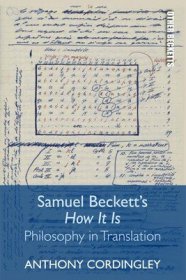
现货Samuel Beckett's How It Is: Philosophy in Translation[9781474440608]
¥ 841 九五品
仅1件
上海宝山
认证卖家担保交易快速发货售后保障
作者Cordingley, Anthony
出版社Edinburgh University Press
ISBN9781474440608
出版时间2018-10
装帧精装
纸张其他
页数336页
正文语种英语
上书时间2024-03-29
- 最新上架
商品详情
- 品相描述:九五品
- 商品描述
- This book maps out the novel''s complex network of intertexts, sources and echoes, interprets its highly experimental writing and explains the work''s great significance for twentieth-century literature. It offers a clear pathway into this remarkable bilingual novel, identifying Beckett''s use of previously unknown sources in the history of Western philosophy, from the ancient and modern periods, and challenging critical orthodoxies. Through careful archival scholarship and attention to the dynamics of self-translation, the book traces Beckett''s transformation of his narrator''s ''ancient voice'', his intellectual heritage, into a mode of aesthetic representation that offers the means to think beyond intractable paradoxes of philosophy. This shift in the work''s relation to tradition marks a hiatus in literary modernism, a watershed moment whose deep and enduring significance may now be appreciated.
— 没有更多了 —
![现货Samuel Beckett's How It Is: Philosophy in Translation[9781474440608]](https://www0.kfzimg.com/sw/kfz-cos/kfzimg/17733071/98083ab60c205103_b.jpg)

![现货Materials and Technologies of Modern Production[9783036401683]](https://www0.kfzimg.com/sw/kfz-cos/kfzimg/17733071/5fd2824531e165d7_s.jpg)
![现货Introduction to Container Ship Operations and Onboard Safety[9781032155425]](https://www0.kfzimg.com/sw/kfz-cos/kfzimg/17733071/58b7ff43ef7909ee_s.jpg)
![现货Electrophosphorescent Materials and Devices[9789814877343]](https://www0.kfzimg.com/sw/kfz-cos/kfzimg/17733071/18cc1d77bcb7b488_s.jpg)
![现货Organic Semiconductors for Optoelectronics[9781119146100]](https://www0.kfzimg.com/sw/kfz-cos/kfzimg/17733071/24c85a750c708964_s.jpg)
![现货Advances in Food Rheology and Its Applications[9780081004319]](https://www0.kfzimg.com/sw/kfz-cos/kfzimg/17733071/e0c11603c9119d4d_s.jpg)
![现货Advanced Materials and Sustainable Technologies[9783035727562]](https://www0.kfzimg.com/sw/kfz-cos/kfzimg/17733071/dced675333874c48_s.jpg)
![现货Advanced Materials and Manufacturing Engineering II[9783035712681]](https://www0.kfzimg.com/sw/kfz-cos/kfzimg/17733071/660ccfae75fa8d3e_s.jpg)
![现货Materials in Machinery and Construction[9783035718119]](https://www0.kfzimg.com/sw/kfz-cos/kfzimg/17733071/6f402060775e9daa_s.jpg)
![现货Cereal Grain Quality (Softcover Reprint of the Original 1st 1996)[9789401071772]](https://www0.kfzimg.com/sw/kfz-cos/kfzimg/17733071/f93ca1c96a97403a_s.jpg)
![现货Samuel Beckett's How It Is: Philosophy in Translation[9781474440608]](/dist/img/error.jpg)
以下为对购买帮助不大的评价